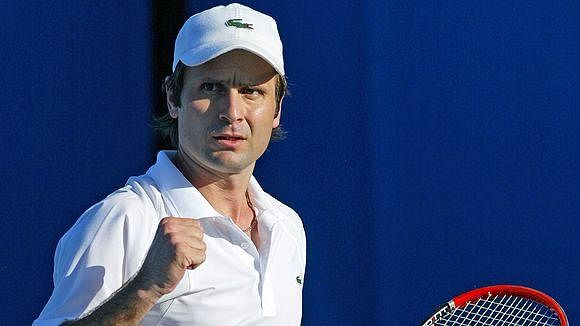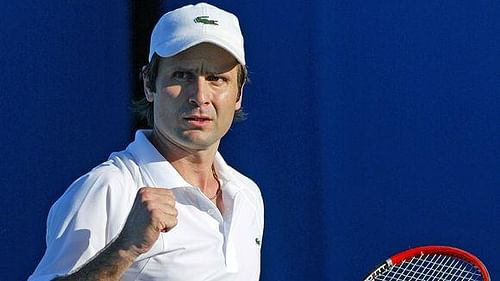
Australian Open 2010: A faceless record, and a magician's final act
A look at some of the more attention-grabbing events from Day 2 of the Australian Open:
Top seeds make reasonably quick progress:
It was a subdued Serena Williams that took the court in a Grand Slam match for the first time since her infamous tirade at last year’s US Open semifinals, but interestingly, her controlled tennis paid her rich dividends. She played within herself for the most part against promising youngster Urszula Radwanska, which helped her score a thumping 6-2, 6-1 victory. Her movement throughout the match gave no indication of the right leg injury she suffered a week ago, and she was in excellent spirits after the match, sweet-talking the Aussie crowds and joking around with the presenters. As, of course, anyone would, after having just made light work of a potentially dangerous opponent.
Roger Federer had a rather more difficult time, dropping the first set against Russian Igor Andreev, and going through a mid-match scare in the 3rd set, having to fight off 3 set points, but he finished strongly, grinding out a 4-6, 6-2, 7-6, 6-0 win. Pre-tournament fears about Federer’s possible lack of motivation to do well here have not altogether been alleviated, and Federer will need to lift his level of play if he wants to silence the doubters.
Previous year’s breakthrough performer suffers a meltdown, again:
First Marcos Baghdatis, then Jo-Wilfried Tsonga, now Robin Soderling. What is it with first-time Slam finalists and their subsequent slumps? After having spent most of last year convincing people that he was for real with a string of impressive results, Soderling was back to his old inconsistent self, blowing a 2-set lead before losing in five sets to Spanish claycourt specialist Marcel Granollers. A sad development, considering he had only a couple of weeks ago broken the Federer code, defeating him for the first time in 12 tries (albeit in an exhibition). Is it time for another prolonged downward spiral for a player seemingly destined for better things?
Fluctuating fortunes for national hopes:
Players from the host country had a largely successful day, with Samantha Stosur, Casey Dellacqua and Lleyton Hewitt notching up victories, but big-serving Carsten Ball faded after taking the opening set against Fernando Verdasco and Alicia Molik came up short against spirited Frenchwoman Julie Coin.
Speaking of the French, Richard Gasquet suffered his second Australian Open heartbreaker in a row, going down in five to Russia’s Mikhail Youzhny, having endured a torrid loss to Fernando Gonzalez last year in an epic five-set thriller. Some guys are just not meant to take that next step.
Three of America’s Great Big Hopes, meanwhile, flamed out – Sam Querrey, Melanie Oudin and Ryan Harrison all dropped their first round matches. On the other hand, their Forgotten Hope, Donald Young, secured a much-needed confidence booster, getting past Christophe Rochus in 4 sets. Hopefully, this won’t start off another wave of the Donald Young hype machine – the media just needs to let the kid be.
A record-setting match destined to be forgotten:
Perhaps the most significant record of this year’s Australian Open was set in a first round women’s match featuring two of the most obscure players in action today. The Czech Republic’s Barbora Zahlavova Strycova defeated Russian Regina Kulikova 7-6, 6-7, 6-3 in a marathon match that went on for 4 hours and 19 minutes, making it the longest women’s Grand Slam match in the Open era. Remember those names; they might come in handy in a trivia quiz competition.
Ernests Gulbis continues to disappoint:
The wait continues for the spectacularly gifted Latvian Ernests Gulbis. He lost in straight sets to Juan Monaco, getting broken an alarming 8 times in the match. For someone with as big a serve as Gulbis, that’s just plain nonsense. Will the kid ever screw his head on straight?

fabrice-santoro
The Magician refuses to vanish:
French veteran Fabrice Santoro became the first player in history to play in 4 different decades, that is, if you accept that this year marked the beginning of a decade (I personally don’t – the decade starts in 2011, as any statistician will whole-heartedly testify). Predictably, he lost in straight sets to the surging Croat Marin Cilic, thus ending a remarkable career, if not for the quality of results it produced, then at least for its longevity. Add the befuddling craftiness and exquisite variety that Santoro brought to the table, and you get the reason why he is so loved in all parts of the globe. Pete Sampras got it right when he called Santoro a ‘Magician’ after suffering an embarrassing loss to him several years ago – the nickname has stuck like no other. And not without reason.